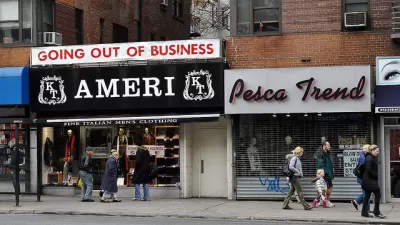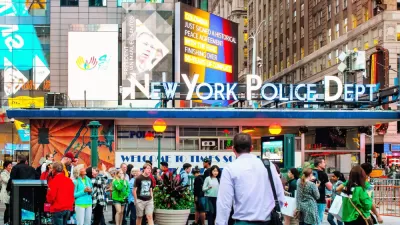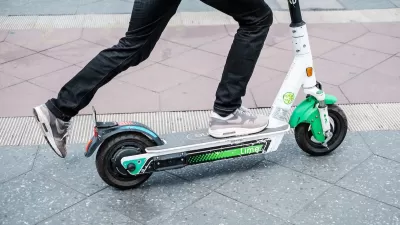Announced on Monday by Mayor Michael Bloomberg and NYCDOT Commissioner Janette Sadik-Khan, America's largest bike share program will be named Citibike, for its lead sponsor Citibank, reports Branden Klayko.
To be comprised of ten thousand bikes located at six hundred stations around Brooklyn, Manhattan, and Queens, by next year, Citibike's public debut on Monday also offered a glimpse of the design of the bikes (in Citibank's trademark bright blue) and the solar-powered, wireless docking stations.
"Citibank has committed $41 million over the next five years to jumpstart the program, with MasterCard chipping in another $6.5 million, meaning no public money will be required to launch the system. 'We're getting an entirely new transportation network without spending any taxpayer money,' Bloomberg said. 'Who thought that could be done?'"
The prices for bike rental were also revealed. An annual pass for the system will cost $95.00, with weekly passes at $25.00 and daily passes $9.95. According to the Citibike website, borrowing a bike for less than 30 minutes will be free.
FULL STORY: Ten Thousand Blue Citibikes to Hit New York Streets

Alabama: Trump Terminates Settlements for Black Communities Harmed By Raw Sewage
Trump deemed the landmark civil rights agreement “illegal DEI and environmental justice policy.”

Study: Maui’s Plan to Convert Vacation Rentals to Long-Term Housing Could Cause Nearly $1 Billion Economic Loss
The plan would reduce visitor accommodation by 25% resulting in 1,900 jobs lost.

Why Should We Subsidize Public Transportation?
Many public transit agencies face financial stress due to rising costs, declining fare revenue, and declining subsidies. Transit advocates must provide a strong business case for increasing public transit funding.

Paris Bike Boom Leads to Steep Drop in Air Pollution
The French city’s air quality has improved dramatically in the past 20 years, coinciding with a growth in cycling.

Why Housing Costs More to Build in California Than in Texas
Hard costs like labor and materials combined with ‘soft’ costs such as permitting make building in the San Francisco Bay Area almost three times as costly as in Texas cities.

San Diego County Sees a Rise in Urban Coyotes
San Diego County experiences a rise in urban coyotes, as sightings become prevalent throughout its urban neighbourhoods and surrounding areas.
Urban Design for Planners 1: Software Tools
This six-course series explores essential urban design concepts using open source software and equips planners with the tools they need to participate fully in the urban design process.
Planning for Universal Design
Learn the tools for implementing Universal Design in planning regulations.
Smith Gee Studio
Alamo Area Metropolitan Planning Organization
City of Santa Clarita
Institute for Housing and Urban Development Studies (IHS)
City of Grandview
Harvard GSD Executive Education
Toledo-Lucas County Plan Commissions
Salt Lake City
NYU Wagner Graduate School of Public Service





























